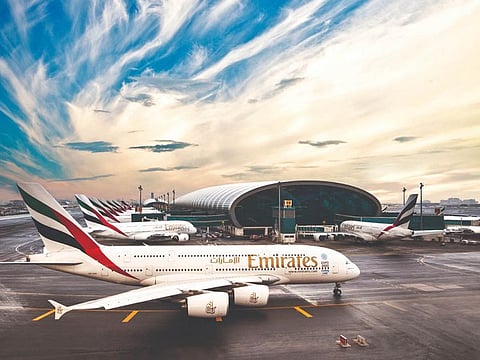Dubai airport remains world's busiest international aviation hub, with Dubai-Riyadh the busiest route
UAE airlines maintain packed January schedules despite Omicron

Dubai: Dubai International Airport remains the world’s biggest international aviation hub, with flights from Dubai to four cities among the Top 10 routes this month. Dubai-Riyadh remains the busiest with a seat capacity of 289,396 seats, while Dubai-London Heathrow had 247,145 seats.
The other two high-capacity flights from Dubai are to Jeddah and Bahrain. The numbers from the aviation consultancy OAG clearly show that Dubai and UAE airlines maintain optimum flight schedules despite having to deal with the Omicron variant. In fact, the data shows the overall global scheduled flight capacity dropped by 1.7 million seats in the week ending January 17 compared to the week before.
Flights from the UAE saw a marginal 2.6 per cent decline in seat capacity, while Saudi Arabia’s flight capacity reduced 1.9 per cent. India, where state-wide restrictions were re-imposed, saw the biggest cut by over 12 per cent.
“This week, 13 global regions reported cuts in airline capacity, with South Asia leading the way with a 10 per cent reduction,” said John Grant, aviation analyst, in an OAG blog. “The majority of which is down to capacity cuts in India, where IndiGo have dropped nearly 20 per cent of their flying,”
Earlier this week, India’s largest low-cost airline IndiGo said it expects to cancel around 20 per cent of its scheduled operations. “Large numbers of IndiGo customers are changing their travel plans (because of Omicron),” the airline said in a statement. “With the reduced demand, we will also be selectively withdrawing.”
Carriers in Western Europe had another week of declines with capacity falling by 5 per cent. “Western Europe is now at just 60 per cent of the pre-Covid levels although Southeast Asia continues to lead that unfortunate measurement with less than 50 per cent of normal capacity operating,” Grant said
New routes too
Dubai’s Emirates airline resumed flights to several African destinations after a few weeks of suspension, showing that regional carriers are working to bring back routes quickly even as some big aviation markets continue to have travel restrictions.
The world’s largest long-haul carrier restarted flights to and from Guinea (CKY), Cote d'Ivoire (ABJ), Ghana (ACC), Uganda (EBB) and Angola (LAD). Emirates, which is operating to more than 120 destinations, also started daily passenger flights into Johannesburg.
UAE’s low-cost carriers are already making plans to expand. Wizz Air Abu Dhabi will start flying to three new destinations from February, taking its total network to 37. Air Arabia, along with Armenia’s sovereign wealth fund, launched a new airline - Fly Arna - thath will take to the skies in late May and serve markets such as Central Asia, Russia and the Middle East.
“Our aim is of course to stimulate the market to bring more people to and from Armenia and to grow the size of the business overall,” said Adel Al Ali, Air Arabia’s CEO. “Our prices have always been competitive and that will continue to be the business model.”
Popular spot
It also helps that Dubai, even during the two-year long pandemic, continued to be a tourism hub, attracting millions of visitors from around the world.
According to a Tripadvisor list, Dubai has beaten off challengers such as London, Bali and Rome to become the most popular destination for 2022. “Dubai is a destination that mixes modern culture with history, adventure with world-class shopping and entertainment,” Tripadvisor said.
Sign up for the Daily Briefing
Get the latest news and updates straight to your inbox



